Transferts monétaires et mobilité humaine
Les transferts monétaires sont souvent utilisés lors de crises afin de répondre aux besoins des personnes migrantes. Dans cette page, vous trouverez des ressources sur les transferts monétaires et la migration.

La Croix-Rouge se prépare à fournir une aide humanitaire aux migrant·es de la caravane sur le point de quitter le Honduras pour le Guatemala.
©Johannes Chinchilla / FICR.
Conflits, crises économiques et catastrophes sont autant de raisons ayant contraint des personnes à fuir et à traverser des frontières dans des conditions éprouvantes et risquées, en quête de sécurité et de moyens de subsistance. En 2020, le nombre de personnes déplacées de force s’est envolé au niveau sans précédent de plus de 80 millions de personnes, soit près du double du nombre enregistré il y a une dizaine d’année. Cette tendance s’aggrave et les effets du changement climatique menacent de déplacer jusqu’à 200 millions de personnes d’ici 2050.
L’assistance monétaire est de plus en plus utilisée afin de répondre aux besoins des personnes en situation de déplacement. On y a eu recours à grande échelle dans différents contextes de migration, en Europe en 2015 jusqu’au Venezuela pour « los caminantes ». Elle a également été utilisée dans d’autres crises migratoires, notamment en Amérique centrale, au Sahel, en Méditerranée et dans la Corne de l’Afrique. L’assistance monétaire est à l’heure actuelle l’une des principales formes d’aide apportée aux populations déplacées en Ukraine et dans les pays voisins.
Il existe une myriade de perspectives et de définitions concernant le mot « migrant·e » et la façon dont les humanitaires doivent agir. C’est pourquoi nous ne choisissons pas une définition unique pour le moment, étant donné que les discussions sur l’assistance monétaire et la migration en sont encore à leurs prémices et que le langage évolue encore.
Documenter et partager les données probantes donnera lieu à des interventions plus efficaces. Cette page contient une sélection de ressources utiles concernant la migration et le recours à l’assistance monétaire. Elle sera mise à jour au fil des discussions ayant lieu dans les espaces humanitaires des transferts monétaires.
Priorités actuelles
Afin de contribuer aux progrès relatifs à cet enjeu, nous nous engageons à :
- soutenir la création de données probantes aux niveaux régional et mondial ;
- contribuer aux solutions pratiques visant à mettre en œuvre les transferts monétaires auprès des personnes migrantes ;
- organiser des discussions sur les enjeux majeurs basées sur des données probantes.
Contenu récent
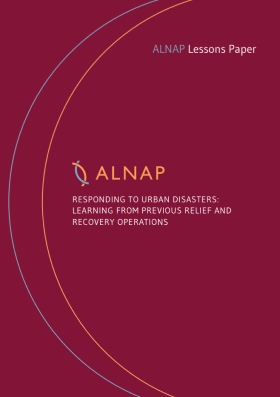
Responding to Urban Disasters: Learning from Previous Relief and Recovery Operations
Report
This paper outlines key lessons related to the design and implementation of urban disaster-response programmes. It focuses particularly on the response and early recovery phases of an urban emergency, and on natural disasters such as earthquakes and flooding. It is written for people planning and...
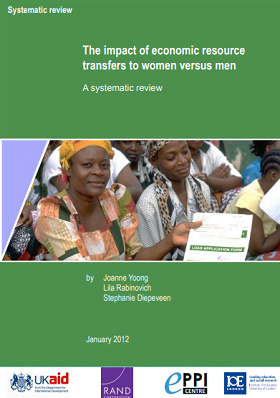
The Impact of Economic Resource Transfers to Women versus Men: A Systematic Review
Report
This systematic review examined the question: “what is the evidence of the impact on family well-being of giving economic resources to women relative to the impact of giving them to men?” This review is of interest to policy-makers and funders in developed and developing countries, given the recent...

Cash and Shelter: A Workshop on Using Cash Transfer Programming for Emergency and Early Recovery Shelter
Presentation
A power point presentation to provide guidance to programme managers, programme implementers and programme support staff when selecting cash as a potential response tool in emergency shelter programmes.
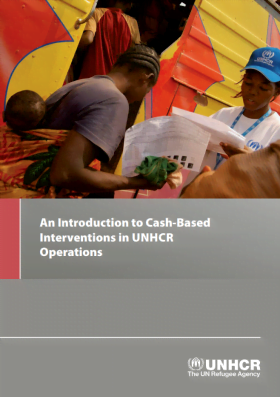
An Introduction to Cash-Based Interventions in UNHCR Operations
Policy paper
This document provides an introduction and basic guidance on the use of cash-based interventions and tackles key issues of relevance to UNHCR in the form of questions and answers. It also provides an overview of UNHCR’s experience in using cash-based interventions.

Annex 1: Multi-Sector Market Assessment (MSMA)
Report
The Multi-Sector Market Assessment (MSMA) Annex is designed to help practitioners examine whether an affected target population can fairly and equitably access the expected amount of goods and services in
order to meet the objectives of the Multipurpose Cash Grant (MPG) programme.
The aim of the MSMA is...

Meta-Evaluation of ACF Fresh Food Voucher Programmes
Report
ACF commissioned a meta-evaluation of five of its fresh food voucher programmes implemented between 2009-2011 during emergencies in Bolivia, Dadaab refugee camps in Kenya, Haiti, Pakistan and the occupied Palestinian Territories (oPT). The programmes were all paper cash vouchers exchanged for fresh foods...

Examining Differences in the Effectiveness and Impacts of Vouchers and Unconditional Cash Transfers
Report
The objective of this study is to examine the differences in the effectiveness and impacts of vouchers versus unconditional cash transfers in the Bushani camp of the Masisi territory of the Democratic Republic of Congo. As part of this research, the study team collected household data from over...
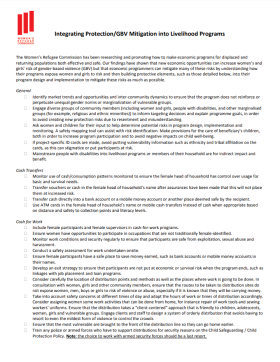
Integrating Protection/GBV Mitigation into Livelihoods Programmes
Guidelines and Tools
The Women’s Refugee Commission has been researching and promoting how to make economic programs for displaced and returning populations both effective and safe. Our findings have shown that new economic opportunities can increase women’s and girls’ risk of gender-based violence (GBV) but that...
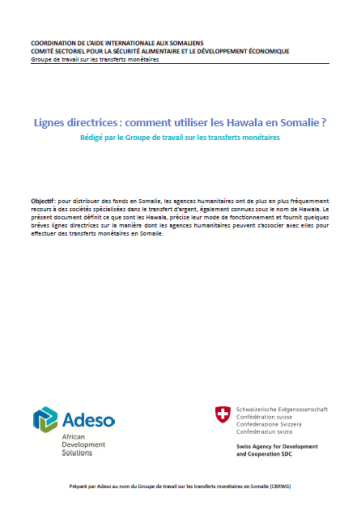
Lignes directrices : comment utiliser les Hawala en Somalie ?
Guides et outils
Pour distribuer des fonds en Somalie, les agences humanitaires ont de plus en plus fréquemment recours à des sociétés spécialisées dans le transfert d’argent, également connues sous le nom de Hawala. Le présent document définit ce que sont les Hawala, précise leur mode de fonctionnement et...
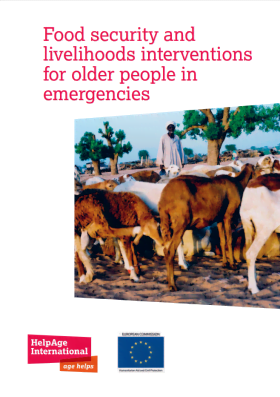
Food Security and Livelihoods Interventions for Older People in Emergencies
Guidelines and Tools
The core theme of this document is the inclusion and empowerment of older people and other vulnerable groups through consultation and consideration during the design and implementation of food security and livelihoods programmes. This document aims to provide general guidance on implementing food...
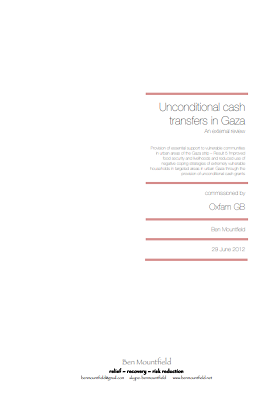
Unconditional cash transfers in Gaza: an external review
Report
This is a review of small pilot project, which targets extremely vulnerable households with monthly unconditional cash transfers for a limited period. The target population is made up of two groups, one group already receiving assistance through a voucher from WFP but still showing poor food diversity...
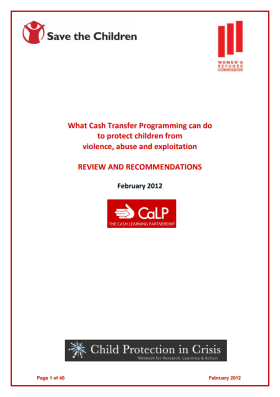
What Cash Transfer Programming can do to Protect Children from Violence, Abuse and Exploitation – Review and recommendations
Report
This discussion paper examines the links between cash transfers and the positive and negative outcomes for children, in particular the role cash transfers have played in protecting children from harm, exploitation, abuse and violence. The objective of this paper is to identify ways in which cash transfer...
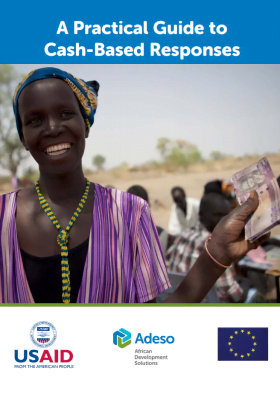
A Practical Guide to Cash-Based Response
Guidelines and Tools
A Practical Guide to Cash-based Responses is a manual developed by Adeso to share the organisation’s experience in developing and implementing appropriate cash-based responses. The manual highlights some practical problems that are faced by implementation teams around the world and it is intended to...

Étude analyse coûts-bénéfice. Intervention "Cash for Work" dans la réponse précoce à la crise alimentaire dans le Sahel.
Rapport
En Mauritanie, comme dans plusieurs pays du Sahel, les populations ont été menacées sévèrement par le choc de la sécheresse en 2012, suite aux mauvaises récoltes de la saison agricole 11-12, conduisant à une crise alimentaire de très grande envergure. Pour faire face à cette crise, Intermón...

MPESA Project Analysis: Exploring the use of cash transfers using cell phones in pastoral areas
Report
Safaricom Limited, a mobile network operator in Kenya, launched a mobile money transfer system called M-PESA in 2007. This system allows users to send or receive money on their Safaricom SIM card. Télécoms sans Frontières and Vétérinaires sans Frontières – Germany decided to work in partnership on...

Haiti – Unconditional Cash Transfers: Lessons Learnt
Report
The challenges of responding to the catastrophic earthquake in Haiti were huge and varied, prompting agencies to think and act creatively. Christian Aid’s partners were at the forefront of the humanitarian response, distributing cash to people affected by the disaster two weeks after the earthquake...

An Emergency Market Mapping and Analysis study Changing Responses to the Haiti Earthquake
Report
Good practice standards guidelines and evaluations all emphasise the importance of including markets in emergency situation and response analysis. While this approach has become more widely accepted by international organisations in recent years, in practice it is clear that support is still needed to...
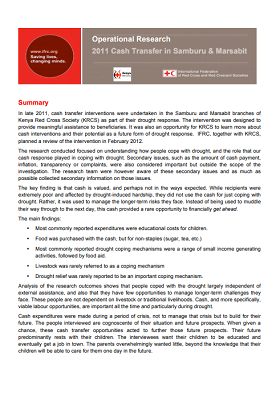
Operational Research: 2011 cash transfer in Samburu & Marsabit
Case Study
In late 2011, cash transfer interventions were undertaken in the Samburu and Marsabit branches of Kenya Red Cross Society (KRCS) as part of their drought response. The intervention was designed to provide meaningful assistance to beneficiaries. It was also an opportunity for KRCS to learn more about cash...
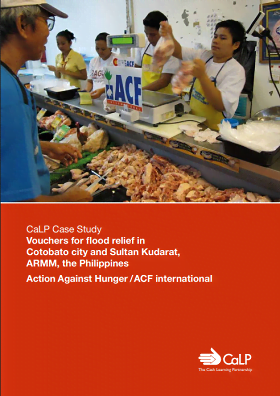
Vouchers for Flood Relief in Cotobato City and Sultan Kudarat, ARMM (Mindanao), the Philippines
Case Study
In response to a rapid-onset emergency, Action Against Hunger / ACF International, with funding from AECID, implemented a cash transfer program in Cotobato City, situated in the Autonomous Region of Muslim Mindanao in the Philippines. The project established a cash voucher program through local...
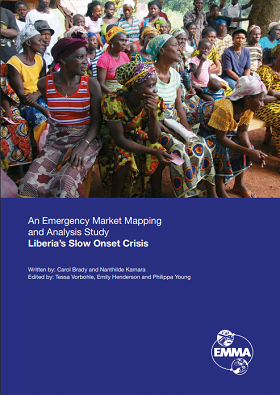
An Emergency Market Mapping and Analysis Study Liberia’s Slow Onset Crisis
Report
In 2010, contested elections in neighbouring Côte d’Ivoire, and the violence that ensued, forced hundreds of thousands of people from their homes. As of 7th of July 2011, the United Nations High Commissioner for Refugees (UNHCR) had counted a total of 153,000 refugees crossing the border into Liberia....